Olive Furnace – Washington Tp. – Lawrence County, Ohio
Built: 1846
By: John Campbell, John Peters, and others.
Daily Ton: 16
Stack: 37 Feet
Blast: Hot Charcoal
Researched by Sharon M. Kouns and others
In 1845 John Peters, Sr. joined John Campbell, Madison Cole, William Clements, and J. L. Thompson in erecting Olive Furnace. Mr. Peters became superintendent. John Peters was an active manager of Olive Furnace for about six years. . . . John Peters was also one of the original owners of the Olive Foundry and Machine Shops, now operated by Lambert Brothers. By 1899, the McGugin Co. had possession of Olive Furnace.
6 April 1876 The Jackson Standard, page 2-When in Portsmouth last week we met an old acquaintance, Mr. McGugin, of Olive Furnace. He informed us that coal had been found near the top of the stack at Olive, which he thinks will prove to be the same kind of coal with which they make good iron at Howard Furnace. He says that Olive owns about ten thousand acres of land to run the furnace perpetually. They have commenced cutting the timber of the second growth.
IR August 4, 1881 – There is some talk of putting post offices at some of the furnaces. Years ago, Olive and Mt. Vernon were post offices, the latter under the name of Campbell. W. N. McGugin was postmaster at Olive, and Robert Scott, at Mt. Vernon. They resigned, and the post offices were discontinued during the war when Mr. Amlin was P.M. at Ironton.
They agreed to have the offices discontinued and buy their stamps, &c., all at Ironton, if Mr. Amlin would put the mail on the cars daily. They thus got a daily mail, and the Ironton P.O. did more business. Previous to (do not have end of this).
Ironton Register, July 30, 1885 – (Country Notes) – Olive is banked up now repairing the hot blast but will be ready to blow it again in a few days. The furnace, this year, so far, has made about 18 tons a day. Mr. W. N. McGugin said that he had never known Olive to work better or more regularly than she has this Summer.
At present, the men are at work in the hay harvest. The Company has a large acreage of meadows, which Mr. M. told us will make about a half crop this year. They weigh all the hay put it into the barns, and by comparing the weights of this year and last, they can accurately determine the relationship between the two crops.
W. H. McGugin has the finest two-horse teams we have seen anywhere in the county. They are iron gray mares, well-matched, and weigh about 1700 pounds each. Mr. M. has some colts that bid fair to make even finer animals than these.
H. G. Hopkins has charge of the books here, and Charlie Egerton is in the store. Charlie is also the P. M. and Station Agent for the Ironton & Dayton railway. He walks from the furnace to the station twice a day with his mailbag, nearly half a mile away. Charlie says he enjoys the walk; that it affords him good recreation.
Mr. Hopkins has but one Jersey cow now but is still an admirer of the stock.
The Commissioners are making a road through Washington township this Summer. This township has been slighted in the item of roads. All the roads in the township, or nearly so, were made by the furnace companies and kept up by them.
W. N. McGugin told us that John Gard, who was so long a teamster at Olive, now lives in Hamden and that he has lost his sight – is blind – but is in comfortable circumstances.
IR April 20, 1899 – (under heading Washington Furnace ) The McGugin Co. of Olive Furnace has made rapid progress in getting ready for a blast. They are now ready to join the McKinley procession.
IR July 13, 1899 – The Buckhorn Furnace, the property of McGugin & Co., Olive Furnace Post Office, Ohio, will probably be started soon. It has been some time since the stack was operated. It is 38×10 and has a capacity of 8,000 tons annually. The Olive Furnace of the same firm is in operation and will run regularly. American Manufacturer.
SWI Jun 2, 1908 – Mr. Wm. N. McGugin, of Olive Furnace, arrived Friday to spend Decoration Day with his nieces, Miss Kate McGugin, Mrs. C. M. Humes, and cousin Judge E. V. Dean. Mr. McGugin is now past 90 years of age.
NEW BLAST FURNACE – STEEL PLANT AND WIRE MILLS TO BE ERECTED NEAR IRONTON SWI March 16, 1909
Is this county secure another large blast furnace, steel plant, and wire mills?
If the deal currently reported to be pending goes through, there is a very strong probability that it will. Naturally, such an addition to our industrial assets would be most welcome and profitable.
The Irontonian is unofficially informed that there is a movement on foot looking to sell the large and valuable holdings of the McGugin Iron Co. The plans embrace a blast furnace, steel plant, and wire mill in the vicinity of Olive Furnace, this county, to a syndicate that views the property’s development on an extensive scale.
Mr. McGugin could not be seen last night to verify the report. Still, it is known that Mr. H. A. Henry of Pittsburg, who is said to be the representative of those interested in the purchase, has been in Ironton for several days the guest of Mr. McGugin and other local men and that he has taken steps for an expert investigation of the McGugin company’s holdings, which are rich in ores, limestone, coal, and other minerals.
An Irontonian representative called the New Ironton Hotel last night to see Mr. Henry. Still, he had left the city on the afternoon train, having been joined here by his wife and son, who are located at Akron, O. Just to what extent the negotiations have progressed, it is impossible to state, in the absence of opportunity to interview those locally interested, but that the deal is pending is beyond question.
The McGugin lands are among the richest in Southern Ohio and bear every natural advantage as a splendid sight for any big industry. The location of several large plants would be another big feeder for Ironton and make another lively little town within the borders of the county.
As soon as Mr. McGugin can be seen, we may be able to present some more definite information regarding the matter, either one way or the other. In the meantime, it is hoped that it is all true and that whatever negotiations are in progress may be speedily concluded.
We give herewith a cut showing the location of Olive Furnace, about which the McGugin lands are located.
“AFTER LIFE’S FITFUL FEVER, HE SLEEPS WELL,” HON. WILLIAM N. MCGUGIN RIPE IN YEARS AND RICH IN FRIENDSHIPS, ANSWERS THE FINAL CALL OF HIS MASTER, “COME UNTO ME.”
IR December 9, 1909, Just as the clock struck six Tuesday evening, the spirit of Mr. William N. McGugin of Olive Furnace winged its flight back to the God who gave it. And as the attendants – children and friends – watched at his bedside, they saw his passing, without a struggle, “soothed and sustained by an unfaltering trust like one who wraps the drapery of his couch about him and lies down to pleasant dreams.”
The death of Mr. McGugin, while not unexpected, will cause genuine sorrow throughout all of Southern Ohio, where he was so well and favorably known. He had reached the advanced age of 94 years and, for the past two or three years, had been failing in health quite perceptibly, yet his wonderful vitality and strong constitution caused him to rally from all his attacks of sickness except the last. He has been hovering between life and death for six or eight weeks, and his passing at the above hour was marked only as a peaceful sleep without a struggle.
Mr. McGugin is dead, but his life was such that he left the world better for having lived in it.
Probably nowhere in the Iron trade is there to be found a record for continuous connection with one furnace property more remarkable than that of Mr. McGugin, for so long president of the McGugin Iron and Coal Co., Olive Furnace.
Since 1851, which is about 58 years, he was identified with the operation of Olive and Buckhorn furnaces for many years, two of the most important producers in the famous old Hanging Rock region. Until quite recently, he was the head of this company. He was familiar with every detail of its operations, but owing to his extreme age, its management in the last few years has been largely entrusted to his son, W. H. McGugin, as secretary treasurer.
Mr. McGugin was one of the best-known of the many interesting characters the Hanging Rock region has produced.
William Naylor McGugin, son of Joseph and Ann Naylor McGugin, was born in Wooster, Ohio, on the 27th day of December 1817. His parents lived at that time in a log house that was torn down a few years ago and where the Archer House now stands.
His father’s parents lived in Washington County, Pennsylvania, and were of Scotch Irish descent, while his mother’s people lived above Pittsburgh on the Monongahela river and were of English descent. His father was a hatter by trade.
Wooster, at that time, was a comparatively new town, being laid out in 1813. There were no public schools then, but in subscription schools he attended, each scholar paid one dollar a month of tuition.
His father died when he was nine years old, so he went to work when about fifteen years old for his uncle, Robert William Naylor, in his store, as an errand boy. Staid there for over two years and then went into the store of Mitchell and Jacobs, where he stayed for several years.
While there, he met Matilda Thompson, the girl he later married, who, at that time, was about twelve years old. She lived across the street on the opposite corner of the store. One day while waiting on her, Mr. Jacobs remarked, “Billy! that’s the girl for you!” Mitchell and Jacobs sold out to Mr. Summers, and he remained with him.
While in Naylor’s store, a traveling show troupe came to town. It consisted of a man and his wife and three or four others, with the man by the name of Merritt at the head of it.
The hotel where they stopped was on the same lot as the store, and they performed at night in a room at the hotel, which did not have an opera house, etc., at that time. In the same room later was a show, having for its sole entertainment a model for a locomotive, which was quite a curiosity, no one ever having seen such a thing.
It was one of the first models ever made and ran to and fro across the room on a wooden track. This was about 1833. The admission fee was 12 1/2 cents. They had no dimes at that time but 12 1/2 and 6 __ cents in silver.
Mr. Merritt went from Wooster to Fredericksburg about nine miles below Wooster and stopped at Barne’s Tavern, where the troupe became stranded and left Merritts and his wife at the Tavern without any money.
Two men, Mr. D. K. Jones, and a cabinet maker, were boarding at the hotel. Merritt told them if they could advance him the money to buy tools, he would make a machine to cut wood type for headings for newspapers, which were very expensive and scarce at that time, having to be made by hand.
The clock peddlers who traveled through the country sold the type for them. After the type business was well established, he commenced inventing the sewing machine. He made enough money to pay his liabilities at Fredericksburg and take him to Pittsburg, where he changed his name to Singer. Here he went out; and completed the sewing machine as he thought. From Pittsburg, he went to New York and made numerous improvements to his invention there.
William McGugin remained with Mr. Summers for several years in the dry goods business and was married on June 6th, 1843, to Matilda Thompson. In 1846 they went to the old Marble Furnace in Adams county with another gentleman and started a small foundry on the old furnace site, where he remained ____ years. When they moved then, it was quite an undertaking. Went from Wooster to Massilon, a distance of twenty-two miles, in wagons and waited for a canal boat.
The canal boats at that time had small bedrooms, and each family could have one. Then they had a stable for the horses on one end and, after a certain length, would change the horses, having what horses they needed on the boat. It took about a week to make the trip on the canal, and they arrived at Jasper at night. The hotel where they stopped was a sort of saloon, and there was only a thin partition between that and their room, so they were kept awake by the drunken fellows. Went the next day to old Marble Furnace in wagons.
In 1851 he sold out there and moved to Gallia Furnace, where he clerked for Bentley, Peters & Co. for a short time until changes were made in the business. He was offered a higher salary to come to Olive Furnace, who he accepted, coming thence in the fall of 1851 and remaining there till death.
At that time, he worked for Campbell, Peters & Co. W.N. and Samuel McGugin bought Mr. Peters out in January 1864, and the firm name was changed to Campbell, McGugin & Co. In 1876 on account of Samuel McGugin’s death, Campbell, McGugin & Co. bought his interest in the firm.
Then in 1883, McGugin & Co. bought Mr. Campbell’s interest, which remained in their name until the present writing. (Note – this was the year John Campbell had to make an assignment because of the failure of the company)
Mr. McGugin is survived by his son, W. H. McGugin, of Olive Furnace, and two daughters, Mrs. Edwin Scofield and Mrs. Chas. Scofield of Columbus. Judge E. V. Dean of this city and John Naylor of Tiffin are cousins of the deceased, their combined ages being 263 years. Mr. McGugin was 92 years old, Mr. Naylor was 87, and Judge Dean was 84.
Morning Irontonian – November 19, 1915 – Old Olive Furnace Sold – Salle Bros. has bought M. E. Beman, receiver for the Olive Furnace, the old furnace, and will begin in a few days to dismantle it for scrap iron.

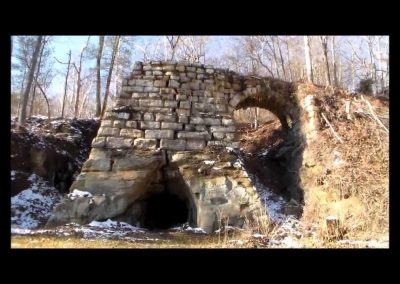
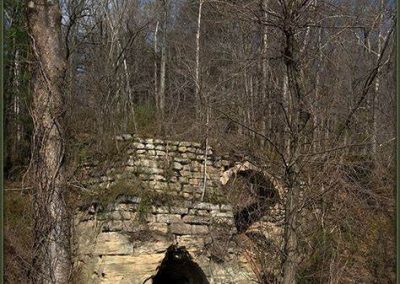
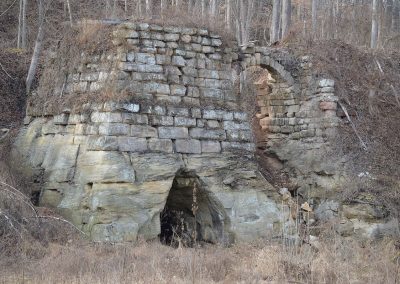
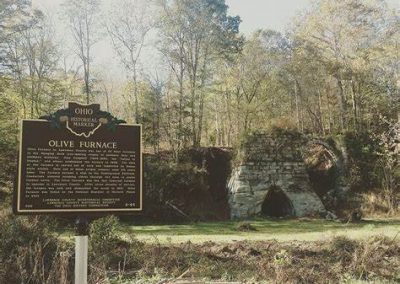
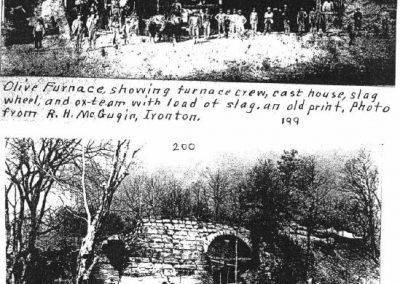
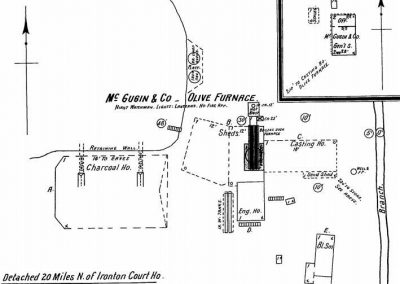
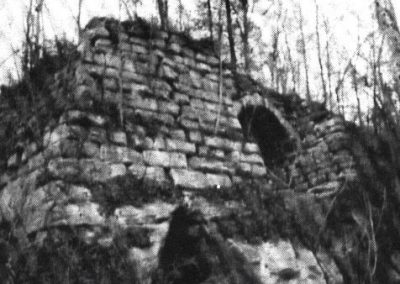
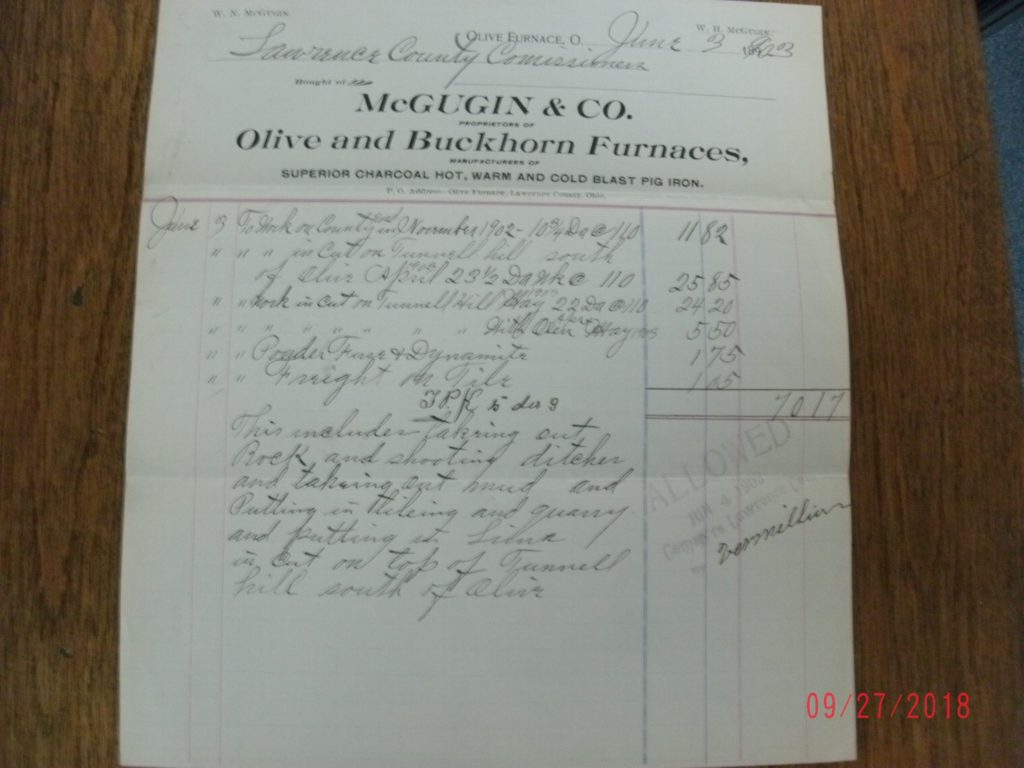
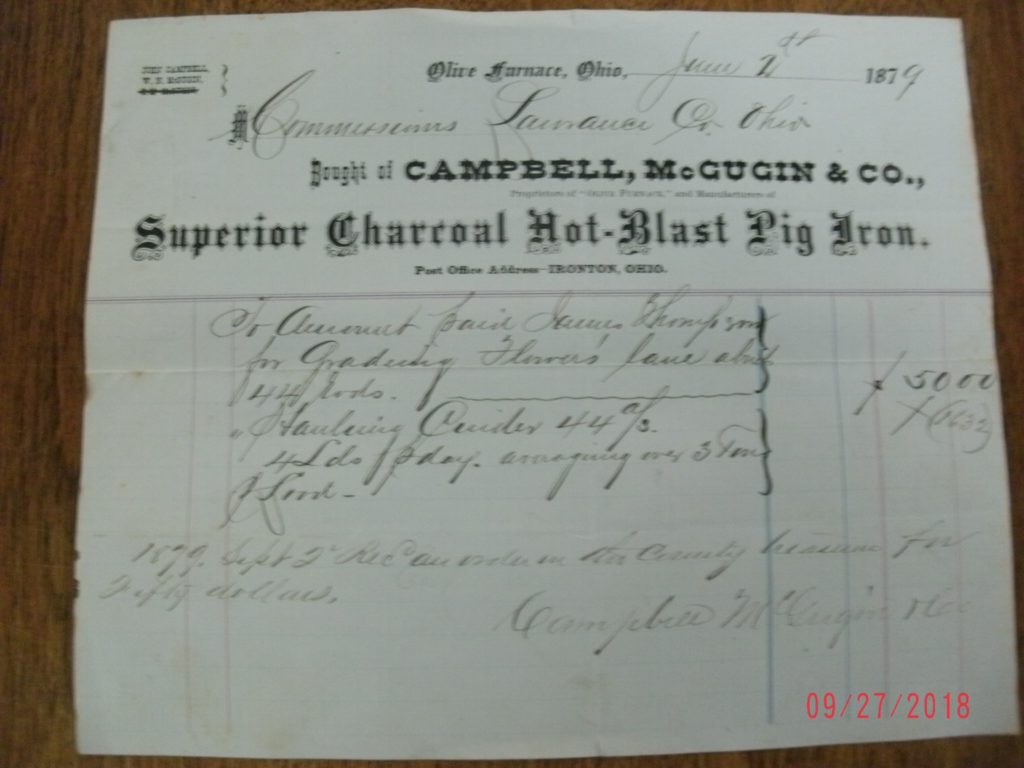
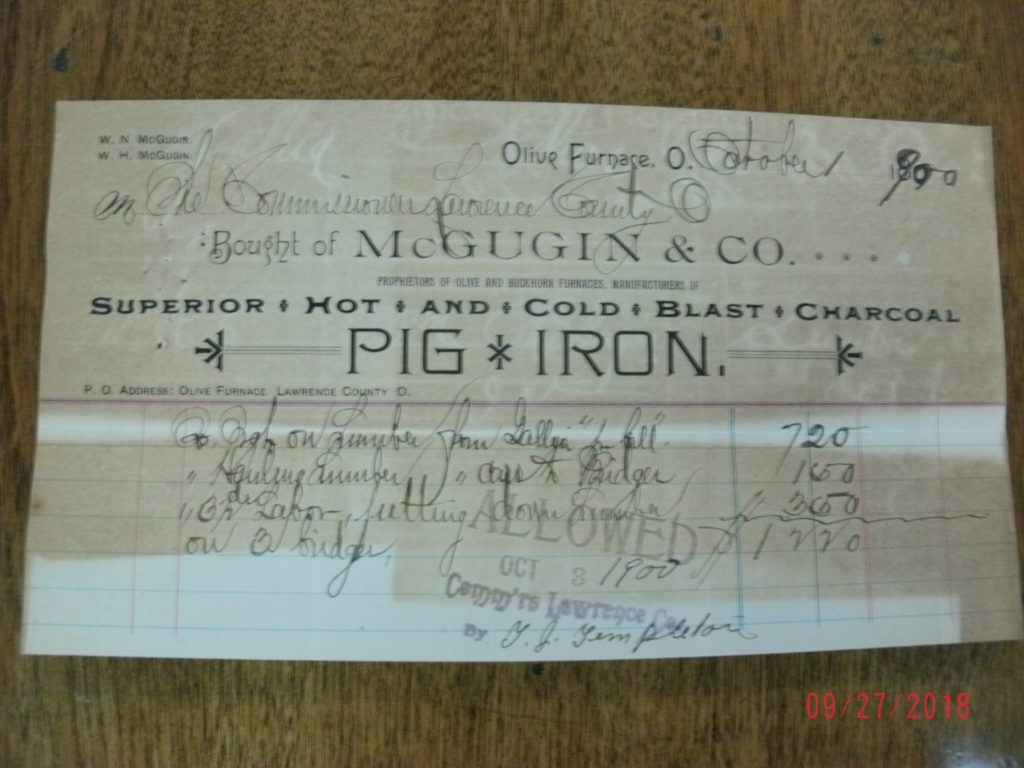
0 Comments